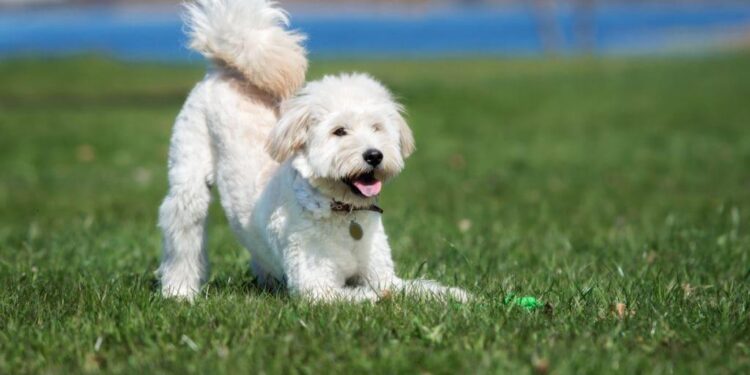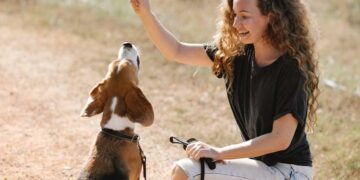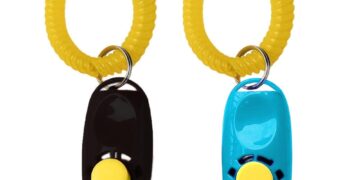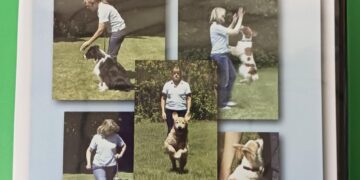Table of Contents
Introduction: The End of My Leash
It was a classic Portland Tuesday—gray, drizzly, and smelling of damp earth—when I hit my breaking point in Laurelhurst Park.
My dog, Barley, a brindle rescue with soulful eyes and the explosive energy of a firecracker, was at the other end of the leash.
Or rather, he was at the end of my arm, which felt like it was about to detach from its socket.
He saw another dog, a placid-looking Golden Retriever about 50 yards away, and the world dissolved into a frenzy of barking, lunging, and guttural growls.
I was pulled off balance, my boots skidding on the wet leaves, the hot flush of embarrassment creeping up my neck.
This scene had become our ritual, a public performance of my failure.
At home, Barley was my shadow, a goofy, affectionate companion who would rest his head on my knee as I worked.
But the moment we clipped on his leash and walked out the door, a switch flipped.
Our bond, so strong within the four walls of our house, frayed into an adversarial tug-of-war.
I loved him, but I was beginning to dread our walks.
The advice I’d gathered was a dizzying cocktail of contradictions.
“You have to be the alpha,” my uncle insisted.
Online forums were a battleground of conflicting ideologies, from “show him who’s boss” to “just stuff him with treats”.1
I felt trapped between a desire to be kind and a desperate need for control, and it seemed impossible to have both.
My journey to find a solution wasn’t just about finding the “best” trainer in Portland; it was a search for a way to bridge the chasm between the dog I loved and the dog I couldn’t manage.
Part I: The Old Playbook and the Spiral of Frustration
My first foray into professional training was with what’s known as a “balanced” approach.
It sounded sensible, promising a mix of rewards for good behavior and “corrections” for bad.2
The logic was intuitive: teach the dog what to do, but also make it clear what
not to do.
Armed with this new playbook, I tried to implement the techniques.
A sharp tug on the leash when Barley pulled.
A stern “No!” when he fixated on another dog.
I was told these actions were not punishment, but communication—a way to set clear boundaries.
The results were not just ineffective; they were destructive.
Barley’s lunging didn’t stop; it became more frantic, more desperate.
And a new, heartbreaking behavior emerged: he started watching me on our walks with a worried, scanning expression, as if trying to predict the next moment of my displeasure.
Our relationship, the very thing I was trying to improve, was becoming strained and laced with anxiety.
Why It Fails: Deconstructing the Damage
It took me months of struggle to understand that the problem wasn’t my execution of the method, but the method itself.
The “balanced” paradigm was built on a fundamental misunderstanding of canine behavior, and it was creating a vicious cycle of failure for both of us.
- Increased Anxiety and Stress: The core flaw in this approach is that it misdiagnoses the “why” behind the behavior. I thought Barley was being disobedient or defiant. In reality, his reactivity was a manifestation of fear and overstimulation.4 By applying a physical “correction” (a leash pop) the moment he saw another dog, I wasn’t teaching him not to lunge. I was confirming his fear: “When another dog appears, something uncomfortable happens to my neck.” The punishment became associated with the trigger, not the behavior, pouring gasoline on the fire of his anxiety.3
- Erosion of Trust: This approach positions the owner as an unpredictable source of discomfort. Instead of seeing me as his advocate and source of safety in a scary world, Barley was learning that I was a potential threat. Scientifically-backed training philosophies emphasize that aversive methods—including verbal and physical intimidation—damage the human-animal bond and break the dog’s trust.6 I was experiencing this firsthand; the leash connecting us felt less like a partnership and more like a weapon.
- The Owner’s Vicious Cycle: My own frustration became a toxic ingredient in our dynamic. As the methods failed, I grew more tense. My leash pops became sharper, my “No’s” more heated. This is a common experience; online forums are filled with owners admitting to yelling or getting physical out of sheer frustration when training feels impossible.8 My emotional state was telegraphing down the leash, adding to Barley’s stress and guaranteeing more failure.10 We were trapped in a feedback loop: his anxiety fueled my frustration, and my frustration amplified his anxiety. The system was broken.
Part II: The Epiphany: It’s Not a Battle, It’s a Conversation
The turning point came during a free phone consultation with a Portland-based trainer whose website spoke a different language.
It didn’t mention dominance or corrections.
Instead, it talked about “communication,” “welfare,” and “building secure relationships”.11
In that 20-minute call, the trainer reframed my entire problem.
“He’s not giving you a hard time,” she said gently, “he’s
having a hard time.”
It was a profound shift in perspective.
I had been trying to win a battle for control, when I should have been trying to start a conversation to understand his needs.
This epiphany led me down a rabbit hole of modern canine science, where I discovered the foundations of a new, more effective, and far kinder approach.
Dismantling the Dominance Myth
The first pillar of the old playbook to crumble was the “alpha dog” theory.
This pervasive myth, which suggests dogs are in a constant struggle for dominance and that humans must establish themselves as the “pack leader,” is the foundation for most punishment-based training.5
But modern science has thoroughly debunked it.
The theory originated from flawed studies of captive, unrelated wolves in the mid-20th century—an artificial environment that created conflict not seen in natural wolf packs, which are simply family units.5
More importantly, dogs are not wolves.
They have evolved alongside humans for thousands of years.13
Reputable organizations like the Association of Professional Dog Trainers (APDT) now explicitly state that basing interactions on dominance is harmful, creating stress and anxiety rather than resolving it.7
Behaviors we misinterpret as “dominant”—like pulling on the leash, jumping on guests, or barking—are not power grabs.
They are simply attempts to communicate a need, express an emotion like fear or excitement, or behaviors that have been inadvertently rewarded (e.g., jumping gets attention).12
A New Compass: LIMA (Least Intrusive, Minimally Aversive)
With the old, broken compass of dominance theory discarded, I needed a new one.
I found it in an acronym that appears on the websites of many of Portland’s most respected trainers: LIMA.15
LIMA stands for “Least Intrusive, Minimally Aversive,” and it’s an ethical commitment to using the most humane and effective methods first.17
LIMA is guided by a framework called the “Humane Hierarchy,” which ranks training interventions from least to most intrusive.
It requires a trainer to first address a dog’s health and environment before moving to training.
When training does begin, the first and primary tool is positive reinforcement.
Punishment is the absolute last resort, an admission that all other, better options have failed.19
This wasn’t just a different technique; it was a completely different ethical and logical system.
The Breakthrough Philosophy: Relationship-Based Training
This new compass pointed toward a destination: relationship-based training.
This philosophy sees training not as a series of commands to be obeyed, but as a “constant dialog” with our dogs, a lifestyle of mutual understanding and cooperation.21
The goal isn’t a perfectly obedient automaton, but a willing partner.
The most powerful way to understand this shift was through an analogy that modern canine science fully supports: child psychology.
Research shows that adult dogs possess cognitive abilities roughly comparable to a 2.5-year-old human child.23
This parallel is a game-changer.
How do we effectively teach a toddler? We don’t use force, fear, or intimidation.
We use routine, consistency, and patience.
We manage their environment to set them up for success.
We reward the behaviors we want to see, and we redirect them when they make mistakes.24
We act as their trusted guide and caregiver, not their “alpha.” This approach, which feels like common sense when applied to a child, is the very essence of modern, science-based dog training.
The goal is to raise a confident, well-adjusted individual who trusts us to lead, not to create a subdued subject who fears our authority.
Part III: A Tour of Portland’s Positive Training Vanguard
Armed with this new philosophy, Barley and I stepped into Portland’s vibrant positive training scene.
It was like seeing the world in color after years of gray.
We discovered that the best trainers weren’t just technicians; they were skilled educators, coaching the human half of the leash and empowering us with the tools to understand our dogs’ minds.
Their credentials—CPDT-KA (Certified Professional Dog Trainer – Knowledge Assessed), CBCC-KA (Certified Behavior Consultant Canine – Knowledge Assessed)—weren’t just alphabet soup; they were markers of a commitment to a higher, humane standard of practice governed by organizations like the CCPDT and APDT.16
Noble Woof: The Power of Positive Beginnings
To understand how to fix our problems, I first wanted to see how they could have been prevented.
I audited a puppy socialization class at Noble Woof in Southeast Portland.29
The environment was a masterclass in positive foundation-building.
There was no punishment, only skillful management and reinforcement.
The trainers used clickers and high-value rewards to create positive associations with new people, sounds, and other puppies.11
They were focused on building secure attachments and teaching the puppies that the world was a safe, fun place.
It was a clear demonstration of how to build a behaviorally healthy dog from the ground up, preventing the fears that had come to define Barley’s experience.
Rose City Dog Training: A Personalized, In-Home Approach
For our specific issue of leash reactivity, we needed a personalized plan.
We worked with a trainer from Rose City Dog Training, who came to our home.15
This was critical because their philosophy emphasizes training in “real world” locations where the problems actually occur.
In our first session, the trainer spent more time observing and asking questions than giving commands.
She took a holistic, systems-thinking approach, inquiring about Barley’s diet, exercise, health, and daily routines before ever addressing the lunging.31
There was no leash-popping.
Instead, she taught me to recognize Barley’s subtle, pre-lunging body language—a stiffening of the tail, a hard stare—and armed me with a series of “games” to play.
One game involved scattering high-value treats on the ground the moment he saw another dog, changing his emotional response from “Oh no, a threat!” to “Oh boy, a dog means chicken is about to rain from the sky!” We were teaching him an alternative, incompatible behavior and, more importantly, reshaping his perception of the trigger.33
It was a practical application of the LIMA principle, using positive reinforcement to solve a problem that punishment had only worsened.15
Oregon Humane Society: A Community Hub for Learning
To continue building Barley’s confidence and our bond, we enrolled in an “Agility & Games” class at the Oregon Humane Society.34
This experience cemented the idea that training could be a source of joy, not just a remedial chore.
OHS, with its explicit commitment to scientifically-based positive reinforcement methods, provides an accessible entry point for the entire community.34
Navigating the agility course, Barley wasn’t a “reactive dog”; he was a focused, problem-solving partner.
The training was working with his natural cognitive abilities, challenging his brain and body in a way that built confidence and trust.13
This game-based approach, a hallmark of modern training, breaks down complex skills into small, fun, achievable steps.
It ensures a high rate of success, which builds a dog’s confidence and makes them eager to learn, effectively rewiring their brain to be more optimistic and resilient.37
Conclusion & A Curated Guide for Fellow Portlanders
Last week, Barley and I were walking near Mt. Tabor.
A woman with two small, yapping terriers turned the corner unexpectedly.
The old Barley would have exploded.
The old me would have tensed up, choked the leash, and braced for impact.
Instead, I took a breath, cheerfully said, “Find it!”, and tossed a handful of treats into the grass.
Barley, hearing his cue, disengaged from the terriers and buried his nose in the grass, his tail giving a few happy wags.
The woman smiled and walked past.
The leash stayed loose.
The connection held.
My search for the best dog training in Portland led me to a conclusion that was both simple and life-changing: the best training isn’t a specific technique or a secret command.
It’s a change in perspective.
It’s trading a relationship based on control for one built on communication.
It’s about understanding that our dogs are not trying to dominate us; they are trying to navigate a complex human world with the cognitive and emotional tools of a toddler.
Our job is not to be their boss, but to be their patient, empathetic, and trustworthy guide.
For those in Portland starting a similar journey, the landscape of trainers can be confusing.
To help you find your footing, here is a guide to some of the area’s leading relationship-focused professionals.
Your Guide to Getting Started in Portland
Table 1: A Guide to Portland’s Relationship-Focused Dog Trainers
| Training Provider | Core Philosophy | Primary Services | Specializes In | Best For… |
| Noble Woof | Positive Reinforcement (R+), Clicker Training, Relationship-Building 11 | Group Classes, In-Home Private Training, Day Training, Puppy Socials 11 | Puppy Foundations, Fear & Anxiety, Cooperative Care 11 | New puppy owners seeking foundational socialization and families wanting to build a strong, positive bond from the start. |
| Rose City Dog Training | LIMA (Least Intrusive, Minimally Aversive), Reward-Based 15 | Private In-Home Training 15 | Aggression, Separation Anxiety, Leash Reactivity, “Real World” Distractions 15 | Owners dealing with specific, challenging behaviors who need a personalized, intensive plan implemented in their home environment. |
| Oregon Humane Society | Scientifically-Based Positive Reinforcement, Force-Free 34 | Group Classes (Puppy, Reactive Dog, etc.), Private Training, Workshops 34 | General Manners, Reactivity, Community Education, Fun & Agility 34 | Dog owners at all levels looking for affordable, high-quality, and accessible group classes in a supportive community setting. |
| Urban Pawsibilities | Positive Reinforcement, Science-Based | Group Classes, Day Training, Private Training 39 | Reactivity, Fearful Dogs, Basic & Intermediate Manners 39 | Owners of rescue dogs or those with fearful/reactive dogs who would benefit from a patient, specialized approach in a dedicated facility. |
| Diamond Dogs (Torie Silletto) | Humane, Force-Free, LIMA-based 27 | Private Training & Behavior Consultation 26 | Separation Anxiety, Aggression, Complex Behavior Cases 26 | Owners facing severe or complex behavioral issues who need an expert consultant with top-tier certifications (PCBC-A, SA Pro). |
Works cited
- Forums – DogTraining.World, accessed August 14, 2025, https://dogtraining.world/forums/
- Best Dog Training Academy | Dog Training in Portland, Sherwood …, accessed August 14, 2025, https://www.bestdogacademy.com/
- How Balanced Dog Training Fails | Michael’s Dogs Behavior Group, accessed August 14, 2025, https://www.michaelsdogs.com/2021/01/23/how-balanced-dog-training-fails/
- A Beginner’s Guide to Helping Your Reactive Dog Get Better, accessed August 14, 2025, https://www.3lostdogs.com/a-beginners-guide-to-helping-your-reactive-dog-get-better/
- What is the RSPCA’s view on dominance dog training?, accessed August 14, 2025, https://kb.rspca.org.au/knowledge-base/what-is-the-rspcas-view-on-dominance-dog-training/
- Why Punishment Fails in Dog Training: Positive Success Strategies Ever – Absolute Dogs, accessed August 14, 2025, https://absolute-dogs.com/blogs/gamechangers/why-punishment-fails-in-dog-training-positive-success-strategies-every-dog-needs
- Dominance and Dog Training | APDT, accessed August 14, 2025, https://apdt.com/wp-content/uploads/2017/01/dominance-and-dog-training.pdf
- Rebuilding relationship with my dog. – Positively | Victoria Stilwell, accessed August 14, 2025, https://forum.positively.com/viewtopic.php?t=15542
- What’s the best piece of advice you got from a trainer you think everyone should know? : r/Dogtraining – Reddit, accessed August 14, 2025, https://www.reddit.com/r/Dogtraining/comments/13ikj2e/whats_the_best_piece_of_advice_you_got_from_a/
- Frustration And Re-directed Aggression – Dog Problems Solved, accessed August 14, 2025, http://www.dogproblemssolved.com/frustration-and-re-directed-aggression/
- Noble Woof, accessed August 14, 2025, https://www.noblewoof.com/
- Dominance Theory Debunked: Why Your Puppy Isn’t Trying to Be the Alpha Dog (and What to Do Instead) – Manners For Mutts, accessed August 14, 2025, https://mannersformutts.com/blog/2025/06/17/dominance-theory-debunked-why-your-puppy-isnt-trying-to-be-the-alpha-dog-and-what-to-do-instead/
- Canine Cognition | Positively.com, accessed August 14, 2025, https://positively.com/dog-training/article/dog-science-canine-cognition
- Dog Dominance Theory Debunked: What Does it Really Mean? – Wag & Train, accessed August 14, 2025, https://www.wagandtrain.com/dog-dominance-theory-debunked-what-does-it-really-mean
- Rose City Dog Training | Portland Oregon Dog Training |, accessed August 14, 2025, https://rosecitydogtraining.com/
- What is the CCPDT? Dog Training Certification Requirements – The Academy of Pet Careers, accessed August 14, 2025, https://www.theacademyofpetcareers.com/blog/what-is-the-ccpdt/
- canineacademycolumbus.com, accessed August 14, 2025, https://canineacademycolumbus.com/blog/lima-dog-training/#:~:text=LIMA%20dog%20training%20is%20a,of%20punishment%20or%20physical%20force.
- Understanding LIMA Dog Training: A Humane and Effective Approach, accessed August 14, 2025, https://canineacademycolumbus.com/blog/lima-dog-training/
- Position statement on LIMA What Do You Want the Animal TO Do …, accessed August 14, 2025, https://apdt.com/wp-content/uploads/2017/01/position-statement-lima.pdf
- LIMA Dog Training Principles: What You Need to Know – Wag!, accessed August 14, 2025, https://wagwalking.com/daily/lima-dog-training-principles-what-you-need-to-know
- Benefits of Relationship Based Dog Training – Maryville/Alcoa Animal Rescue Center, accessed August 14, 2025, https://maarcadopt.org/benefits-of-relationship-based-dog-training/
- Relationship-Based Dog Training: Benefits – Maui Humane Society, accessed August 14, 2025, https://www.mauihumanesociety.org/wp-content/uploads/2020/12/Relationship-Based-Dog-Training_-Benefits.pdf
- Redefining Parenting and Family – The Child-Like Role of Dogs in …, accessed August 14, 2025, https://econtent.hogrefe.com/doi/10.1027/1016-9040/a000552
- RELATIONSHIP BASED DOG TRAINING PHILOSOPHY – Cullen’s Archangel RescuE, Inc., accessed August 14, 2025, https://www.caretoadopt.org/info/display?PageID=2138
- Kids And Dogs: How Their Learning Styles Are Alike – Best Kids Solutions, accessed August 14, 2025, https://www.bestkidssolutions.com/kids-and-dogs-how-their-learning-styles-are-alike/
- Best Dog Trainers in Portland OR in 2025 | Sniffspot, accessed August 14, 2025, https://www.sniffspot.com/blog/dog-trainers/portland-or
- Diamond Dogs Behavior & Training | Portland Dog Trainer, accessed August 14, 2025, https://www.diamonddogspdx.com/
- HOME – APDT International, accessed August 14, 2025, https://apdt.com/
- Puppy Socialization Classes – Portland Dog Training – Noble Woof, accessed August 14, 2025, https://www.noblewoof.com/puppy-socialization-class-portland-or
- Positive Reinforcement – Dog Training Portland – Noble Woof, accessed August 14, 2025, https://www.noblewoof.com/positive-reinforcement
- The Hidden Multifaceted Systems Impacting Aggression in Dogs – Dog Parentology Podcast, accessed August 14, 2025, https://www.dogparentology.com/post/the-hidden-multifaceted-systems-impacting-aggression-in-dogs
- Dog Training & Systemic Design – Medium, accessed August 14, 2025, https://medium.com/enlivenment/dog-training-systemic-design-90c334b0e2f5
- How Our Games based dog training works – Faithful Friends, accessed August 14, 2025, https://www.faithfulfriends.online/blog/2020/7/2/how-our-games-based-dog-training-works
- Train Your Pet – Oregon Humane Society, accessed August 14, 2025, https://www.oregonhumane.org/training/
- Puppy Classes – Oregon Humane Society, accessed August 14, 2025, https://www.oregonhumane.org/training/puppy-classes/
- Cognitive Dog Training | Courteous Canine, accessed August 14, 2025, https://www.courteouscanine.com/cognitive-dog-training/
- games-based dog training, accessed August 14, 2025, https://fourpawsfourdirections.com/games-based-training
- Game Based Dog Training: What’s It All About? – dogsnet.com, accessed August 14, 2025, https://dogsnet.com/game-based-dog-training/
- Urban Pawsibilities | SE Portland OR Dog & Puppy Training, accessed August 14, 2025, https://www.urbanpawsibilities.com/
- www.reddit.com, accessed August 14, 2025, https://www.reddit.com/r/askportland/comments/zujeof/best_dog_trainers_and_also_dog_training_classes/#:~:text=I%20highly%20recommend%20Urban%20Pawsibilities,from%20the%20owners%20as%20well.






